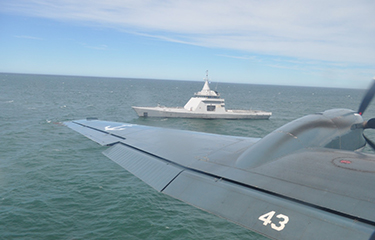Argentina's navy keeping watch on hundreds of Chinese vessels

Argentina is monitoring a fleet of more than 300 Chinese jiggers, longliners, and trawlers as it sales from Pacific waters in Chile through the Straits of Magellan towards the Atlantic.
Argentina's navy is escorting each vessel and following their movements to guarantee that the fleet does not fish within the country’s 200-mile exclusive economic zone (EEZ).
Argentina estimates annual losses of ARS 2.6 billion (USD 25.5 million, EUR 22.5 million) to illegal, unreported, and unregulated (IUU) fishing, and has invested in expanding the surveillance and control capacity of maritime resources in a move to stop those losses. To that end, Argentina Defense Minister Jorge Taiana recently christened a new multipurpose ocean patrol vessel (OPV), the ARA Storni – the third of the four vessels acquired from France to be used for patrols against IUU fishing in the country's EEZ.
The Chinese-flagged fleet has caused consternation among the governments of South America beginning in mid-2020, when it set up in international waters near Ecuador’s exclusive economic zone around the Galapagos Marine Reserve, one of the richest fishing areas and a hotbed of life for the entire planet. The fleet was accused of shutting off its GPS trackers to enable it to fish illegally in protected waters without being detected.
Earlier this year, NGO Oceana analyzed data collected by Global Fishing Watch from 1 January, 2018, to 25 April, 2021, and found hundreds of Chinese vessels “pillaging” the waters off the coast of Argentina. The NGO said many of the vessels frequently disappeared from public tracking systems.
Since then, countries including Ecuador, Peru, and Chile have closely monitored the fleet’s movements and executed coordinated actions to stop any IUU activity.
In November 2020, the governments of Chile, Ecuador, Peru, and Colombia issued a joint statement condemning IUU fishing, specifically calling out the “large fleet of foreign-flagged vessels” encroaching on their territorial waters. The statement committed the group to greater information-sharing efforts and to take joint action to condemn acts of IUU fishing that occur in their EEZs through the Permanent Commission to the South Pacific (CPPS), a maritime regulatory body in which the four countries hold membership.
Towards the beginning of 2021, a leaked document originating from the Office of Intelligence and Analysis – part of the U.S. Department of Homeland Security – recommended the creation of a multilateral coalition with South American nations led by the U.S. to challenge China's IUU fishing and trade practices.
On 22 December, the U.S. Department of Labor announced it awarded a USD 5 million (EUR 4.4 million) grant to combat IUU in Peru and Ecuador in a cooperative agreement for the International Labor Organization. The goal, the department said, is to improve labor conditions in the area by combating IUU fishing in coastal communities. The funding will allow the ILO to address illegal fishing and labor practices in the fishing sector of the two countries, the department said.
“Through this project, the organization will work with local governments, including labor inspectorates and port authorities, artisanal fishers’ unions and national worker federations, universities, and the private sector,” the Department of Labor said. “It will also target vulnerable populations working in the fishing sector – including artisanal fishers – women and those in the Afro-descendant communities working in fish-processing and -canning plants.”
Photo courtesy of the Argentina Ministry of Defense






Share